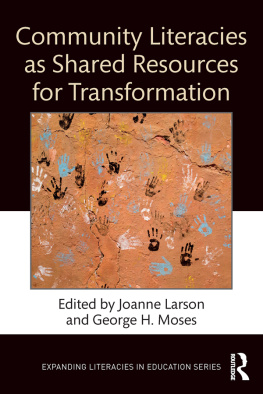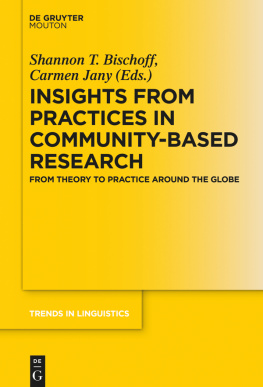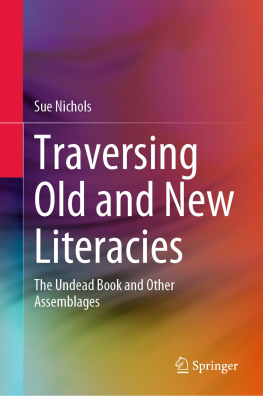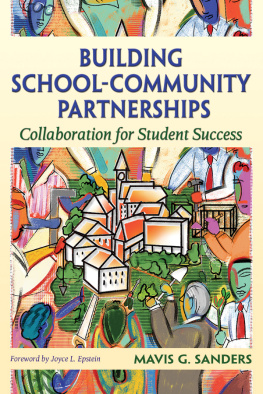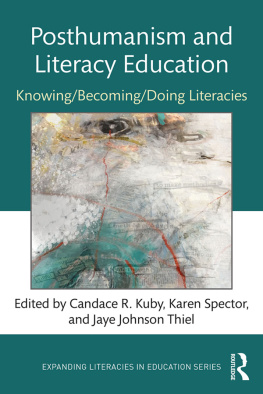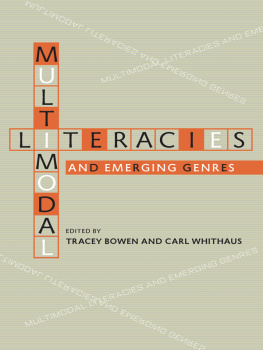
COMMUNITY LITERACIES AS SHARED RESOURCES FOR TRANSFORMATION
Through multiple narratives reflecting the complexity of participatory action research partnerships for social justice, this book sheds light on the dialogic spaces that intentionally support community literacies and rhetorical practices for inquiry and change. Applying literacy as social practice, Larson and Moses tell a story of a unique collaboration between community members and university faculty and students, who together transformed an urban corner store into a cornerstone of the community. Building on the emerging field of community literacies, the book captures the groups active work on the ground and, on another level, how transformation occurred in the dialogic spaces of the research team as it learned to embrace distributed expertise and multiple identities.
Joanne Larson is the Michael W. Scandling Professor of Education at the University of Rochester, USA.
George H. Moses is the Executive Director of North East Area Development, Inc. (NEAD) and Group 14621 Community Association in Rochester, USA.
EXPANDING LITERACIES IN EDUCATION
Jennifer Rowsell and Cynthia Lewis, Series Editors
Larson & MosesCommunity Literacies as Shared Resources for Transformation
RogersReclaiming Powerful Literacies: New Horizons for Critical Discourse Analysis
Zaidi & Rowsell, Eds.Literacy Lives in Transcultural Times
NordquistLiteracy and Mobility: Complexity, Uncertainty and Agency at the Nexus of High School and College
ComberLiteracy, Place, and Pedagogies of Possibility
OrellanaImmigrant Children in Transcultural Spaces: Language, Learning and Love
Enriquez, Johnson, Kontovourki, & Mallozzi, Eds.Literacies, Learning, and the Body: Putting Theory and Research into Pedagogical Practice
Compton-LillyReading Students Lives: Literacy Learning Across Time
Visit www.routledge.com/education for additional information on titles in Expanding Literacies in Education.
COMMUNITY LITERACIES AS SHARED RESOURCES FOR TRANSFORMATION
Edited by Joanne Larson and
George H. Moses
First published 2018
by Routledge
711 Third Avenue, New York, NY 10017
and by Routledge
2 Park Square, Milton Park, Abingdon, Oxon OX14 4RN
Routledge is an imprint of the Taylor & Francis Group, an informa business
2018 Taylor & Francis
The right of Joanne Larson and George H. Moses to be identified as the authors of the editorial material, and of the authors for their individual chapters, has been asserted in accordance with sections 77 and 78 of the Copyright, Designs and Patents Act 1988.
All rights reserved. No part of this book may be reprinted or reproduced or utilized in any form or by any electronic, mechanical, or other means, now known or hereafter invented, including photocopying and recording, or in any information storage or retrieval system, without permission in writing from the publishers.
Trademark notice: Product or corporate names may be trademarks or registered trademarks, and are used only for identification and explanation without intent to infringe.
Library of Congress Cataloging-in-Publication Data
A catalog record for this book has been requested
ISBN: 978-1-138-24337-8 (hbk)
ISBN: 978-1-138-24339-2 (pbk)
ISBN: 978-1-315-27731-8 (ebk)
Typeset in Bembo
by Book Now Ltd, London
We dedicate this book to Miss Vera Mae Gilchrist, who first told us that its all about family, relationships, and community.
CONTENTS
George Moses, Joanne Larson, Joyce Duckles,Joel Gallegos Greenwich, Robert Moses, Ryan Van Alstyne,Courtney Hanny, Jeremy Smith
Joanne Larson, George Moses, Wallace Smith, Joel Gallegos Greenwich
Joanne Larson, Courtney Hanny, Joyce Duckles, Joel Gallegos Greenwich, Robert Moses, George Moses, Kimberly Jones, Jeremy Smith
Courtney Hanny, Joyce Duckles, Jeremy Smith, Robert Moses, Joel Gallegos Greenwich
George Moses, Ryan Van Alstyne, Jeremy Smith, Joanne Larson, Brittany Calvin
Joanne Larson, Joel Gallegos Greenwich, George Moses, Robert Moses, Wallace Smith
Jeremy Smith, Joyce Duckles, Joanne Larson, Robert Moses
Joyce Duckles, George Moses, Ryan Van Alstyne
George Moses, Joanne Larson, Joyce Duckles, Joel Gallegos Greenwich, Robert Moses, Ryan Van Alstyne, Courtney Hanny, Jeremy Smith
As a team, we are very aware of the time and place in which we are writing this book. We are not going to pretend we arent working in unpredictable times; our sociohistorical theoretical lens makes it impossible for us to ignore what is happening. Our research team meetings are permeated with stories of fear and danger we hear from Beechwood residents. Some of us leave meetings to go to protests. We are committed to talk about the issues, rather than call out specific groups, and to focus on how these times have impacted the community in which we work. We stand together to provide leadership in tumultuous times by showing how people in these communities take a standwe are not victims.
Other than the indigenous peoples of the Americas, all U.S. citizens have come from other countries. Our own personal family histories bring together stories from countries around the world. We are Christian and Jewish; we are male and female, straight, gay, and intersexed; we are black, white, and brown. The work of dialogue across difference is difficult work. We do this work in our collaboration described in this book. It is not simply about agreeing to disagree, it is about continuing to discuss the difficult, no matter what and while committing to each other as humans and as family. We stand together in this historical moment to do the work necessary to ensure that all humans are treated as such.
This book has multiple purposes. The first is to share the story of our work with a range of audiences so that authentic, collaborative community transformation can be shared more broadly. To this end, we employ stories. Using stories as the organizing principle throughout the book reflects how African Americans share and transmit history. This focus is in line with another key concept we use, that of sankofa. Sankofa refers to a Twi word from Ghana symbolizing looking to the past to frame the future. In a very real sense, these stories are the shared resources for community transformation we point to in the title of this book.
A second key purpose of this book is to reconsider what counts as knowledge and research. We argue that limiting research and knowledge production to the academy dramatically reduces what humans can learn about ourselves and our world. By collaborating with community in authentic ways, what we learn, and how we learn it, expands in unexpected ways that, in turn, build knowledge that would not have been possible without the collaboration. A third purpose follows from this one: to challenge the academy to value collaborative activist work. Currently, the academy values and rewards traditional, mostly experimental or quantitative, research that is published in tier-one, peer-reviewed research journals. This is important work that should be valued. What we argue is that collaborative, activist work in community be valued and rewarded in similar ways and not marginalized as only activism.
Next page
